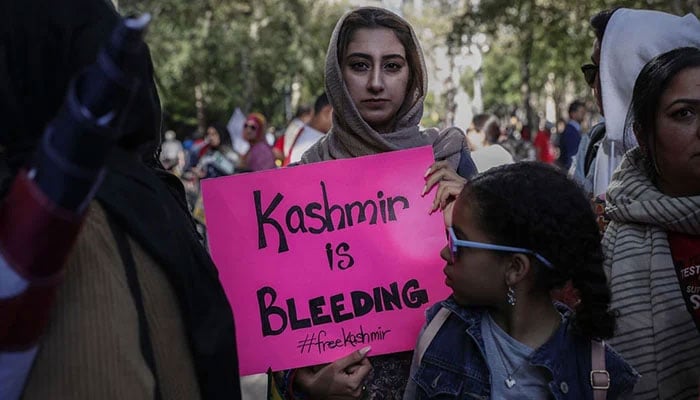Public-centric approaches imperative for global attention on Kashmir issue: experts
MAPIM President Muhammad Azmi reiterats Malaysia’s steadfast support for the Kashmir cause
ISLAMABAD: Addressing a roundtable discussion here, visiting Malaysian Consultative Council of Islamic Organization (MAPIM), President Muhammad Azmi Bin Hamid has regretted that the colonial powers had deliberately left behind unresolved disputes to internally weaken post-colonial societies.
“While the establishment of the United Nations had initially raised hopes for justice, its failure to resolve disputes like Kashmir and Palestine has raised serious concerns about its effectiveness,” he said.
The discussion was hosted by The Institute of Strategic Studies Islamabad (ISSI). Muhammad Azmi reiterated Malaysia’s steadfast support for the Kashmir cause. He suggested that, given shifting global dynamics, informal, people-centric approaches should be prioritized to sustain international attention on Kashmir.
He emphasized the importance of action-oriented research and innovative solutions to create an enabling environment for resolving the dispute. The roundtable discussion was organized to evaluate the current status of the global movement for Jammu & Kashmir and explore strategies to highlight India’s illegal occupation, its continued aggression against Kashmiris, and its denial of the right to self-determination, as enshrined in the UN Charter and relevant Security Council resolutions.
In his remarks Director General ISSI Ambassador Sohail Mahmood applauded MAPIM’s commendable work under Muhammad Azmi’s leadership in advocating for the causes of the Ummah, particularly Kashmir.
He acknowledged MAPIM’s efforts in drawing international attention to the plight of the Kashmiris and emphasized that the delegation’s visit to ISSI provided an opportunity to share insights as well as exchange views on the evolving global dynamics with reference to the Jammu and Kashmir dispute. Former Foreign Secretary and ISSI chief ambassador Sohail Mahmood emphasized that the Jammu and Kashmir dispute must be examined through legal, human rights, and peace and security perspectives.
Legally, he asserted that the Kashmiri people’s right to self-determination is enshrined in international law and UN resolutions, which India has historically evaded while now openly violating these obligations by claiming the territory as its ‘integral part.’ He also highlighted India’s attempts to misrepresent the Kashmiri freedom struggle as ‘terrorism’ and accelerate demographic changes post-August 5, 2019.
On human rights, he highlighted widespread abuses, including prolonged curfews, enforced disappearances, extrajudicial killings, and the persecution of activists, journalists, and youth as part of its agenda to silence dissent and quell resistance in the occupied territory. From a security standpoint, he warned that this unresolved dispute remained the main obstacle in the way of sustainable peace in South Asia.
-
 King Charles Takes A Major Step To Keep Horrified Prince William Out Of The Loop On Andrew: Insider
King Charles Takes A Major Step To Keep Horrified Prince William Out Of The Loop On Andrew: Insider -
 Taylor Swift Set To Make Biggest Cut From Her Wedding Guest: Blake Lively Or Ryan Reynolds
Taylor Swift Set To Make Biggest Cut From Her Wedding Guest: Blake Lively Or Ryan Reynolds -
 Prince William Meets Saudi Crown Prince Mohammed Bin Salman
Prince William Meets Saudi Crown Prince Mohammed Bin Salman -
 Brooklyn Beckham Brutally Cuts Off Inner Circle Amid Feud With David, Victoria
Brooklyn Beckham Brutally Cuts Off Inner Circle Amid Feud With David, Victoria -
 Kaley Cuoco Reveals Why Fiance Tom Pelphrey Sleeps In Seperate Room
Kaley Cuoco Reveals Why Fiance Tom Pelphrey Sleeps In Seperate Room -
 Ghislaine Maxwell Will Not Answer Congress Questions On Epstein
Ghislaine Maxwell Will Not Answer Congress Questions On Epstein -
 Kensington Palace Announces Prince William's Arrival In Saudi Arabia
Kensington Palace Announces Prince William's Arrival In Saudi Arabia -
 ‘Andrew Crisis Follows King Charles Everywhere Now’
‘Andrew Crisis Follows King Charles Everywhere Now’ -
 Jennifer Aniston Already Decided Her Wedding Dress?
Jennifer Aniston Already Decided Her Wedding Dress? -
 Prince Harry, Meghan’s Hollywood Party Drama Exposes Chaotic PR Strategy
Prince Harry, Meghan’s Hollywood Party Drama Exposes Chaotic PR Strategy -
 Jennifer Garner Reacts To Savannah Guthrie's Video As Search For Nancy Guthrie Continues
Jennifer Garner Reacts To Savannah Guthrie's Video As Search For Nancy Guthrie Continues -
 Bad Bunny Leaves Fans Worried With Major Move After Super Bowl Halftime Show
Bad Bunny Leaves Fans Worried With Major Move After Super Bowl Halftime Show -
 Captain Jason Talks Personal Hardships He Faced Ahead Of 'Below Deck' Season 4
Captain Jason Talks Personal Hardships He Faced Ahead Of 'Below Deck' Season 4 -
 Anti-monarchy Group Reacts To Prince William, Kate Middleton Statement On Epstein Scandal
Anti-monarchy Group Reacts To Prince William, Kate Middleton Statement On Epstein Scandal -
 Andrew 'must' Apologize Not Wider Royal Family For Jeffrey Epstein Links
Andrew 'must' Apologize Not Wider Royal Family For Jeffrey Epstein Links -
 Super Bowl 2026: Why Didn't Epstein Survivors Ad Air On TV?
Super Bowl 2026: Why Didn't Epstein Survivors Ad Air On TV?




